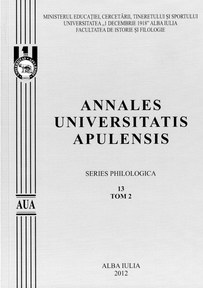The Distortion of an Entire World
The Distortion of an Entire World
Author(s): Carmen DominteSubject(s): Literary Texts
Published by: Universitatea »1 Decembrie 1918« Alba Iulia
Keywords: history; identity; joke; disintegration; communism
Summary/Abstract: One of the most powerful Eastern European writers, Milan Kundera, gives a detailed description of the Czechoslovak world as it was in the ‘50s and ‘60s. This is the place where several important events took place: the revolt of the young people against the communist regime, also known as the Prague Spring, and the Soviet invasion from August 1968. At the same time, this part of Europe was the place for the fight between two different worlds: the new one, governed by the communist doctrine, and the “old” one which does not want to give up. It was the moment when the “war” started. At the first glance, it was a war between two types of worlds: the world as it was and the world as it will be, but everything that the communist regime could promise was only utopian. On the other hand, all these events do not illustrate the revolt of one group of people against another one, but the revolt of people against their own youth; youth representing, in fact, the past that was supposed to be oppressed and changed. The “dialogue” between past and present becomes in Milan Kundera’s literary works a battle between real and ideal, with the only purpose of re-writing the history. Most of Kundera’s novels represents the moment when literature begins to reflect the real interface between the two worlds, the past and the present. He characterizes the setting up of a new regime in his own country, identifying history with a joke. But this joke was able to destroy people’s lives, because history may also err. This study intends to analyze the relationship between the historical reality and its literary representation in one of Kunder’s novels, “The Joke”. It is also a description of the events characterized by the pragmatic and political reasons that were considered, at that time, more important than the humanist ones.
Journal: Annales Universitatis Apulensis. Series Philologica
- Issue Year: 13/2012
- Issue No: 2
- Page Range: 41-50
- Page Count: 9
- Language: English

